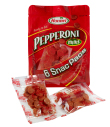‘Enormous opportunities’ in private label
Consumers favor biodegradable over recyclable packaging
Consumers say greener recycled glass is fine
Small pepperoni gets small package
Pouch holds organic baby food

by Rick Lingle
Executive Editor
Beauty no longer resides only in the eyes of the beholder; it’s also appearing in his or her foods and beverages.Mintel Int’lreports that global food and drink product launches with a “beauty-enhancing” claim increased by 306% from 2005 to 2008.
“One in five U.S. women between the ages of 18 and 25 are interested in trying beauty functional products,” notes Taya Tomasello, senior beauty analyst at Mintel. “These numbers really point to an opportunity within this new segment.”
The beauty-enhancing sub-segment of that market has been labeled ascosmeceuticals.Examples include Nestlé’s glowelle, a dietary supplement that protects and hydrates the inner and outer layers of the skin. It debuted last fall at Nieman Marcus in bottled and stick pack formats. Mintel cited Kracie Foods, based out of Japan, which recently launched fruit snacks consisting of dried mangoes, pineapples, papaya and cranberries coated with collagen. It targets women in their twenties to forties who are conscious of their skin health.
But the cosmeceuticals growth comes from a relatively small base within a much larger market: functional foods, also referred to as nutraceuticals:Nutrient-rich products aimed at consumers who appreciate the role of diet in their health, and seek to prevent the onset of chronic disease through the adoption of specific behaviors,as defined in a recentPriceWaterhouseCoopersstudy.
With between $20 billion and $30 billion in sales a year, functional foods comprise about 5% of the U.S. food market, according to PWC. Recent estimates for sector growth range to as much as 20% per year; overall food growth is 1% to 4% yearly.
The optimism appears sustainable because food and beverage companies have shifted direction to meet consumer trends. Five years ago, Nestlé declared it was “moving from an agrifood business to an R&D-driven nutrition, health and wellness company.” Other top food and beverage companies have signaled similar intentions, including Danone, Unilever, General Mills, Kellogg, PepsiCo, Coca-Cola, and Kraft.
What does this mean for packaging? The PWC study indicates that innovative packaging can help differentiate products and justify premium pricing. Optimel Control, for one, uses “daily-dose” packaging, contributing to a significant premium over regular products.
Barrier considerations also come into play. “Higher oxygen-impermeable packaging may be needed to protect the antioxidant ingredients that are often used in these products,” offers Claudia Dziuk O’Donnell, chief editor of our sister publicationsPrepared FoodsandNutraSolutions.
Package design also has to be addressed to highlight the functionality. A “tasteful” look is probably as good-and general-a description as any.
TOP DEVELOPMENTS
‘Enormous opportunities’ in private labelContrary to popular belief, cash-strapped consumers aren't the only ones keen on store brands. New research from Information Resources Inc. (IRI) published byPrivate Label Buyerreveals more than 78% of both lower- and higher-income consumers believe private label products are typically of excellent quality. But according to IRI’s ‘Understanding Emerging Trends and Key Success Factors in Private Label,” shoppers’ positive feelings about store brands haven't yet translated into the kinds of private label shares seen in Europe, suggesting “enormous opportunities” for future growth. In fact, IRI predicts store brands’ dollar share is expected to move in the second half of 2009 from 17% to 18% percent by year’s end. IRI says the best opportunities for private label growth remain in commodity-driven categories without a dominant national brand and relatively low innovation. These include cheese, butter, frozen potatoes/onions and hot cereal.
Consumers favor biodegradable over recyclable packaging
Consumers like the idea of biodegradable packaging, with 88% believing that it's important for packaging to be biodegradable. Also, nearly half would prefer biodegradable packaging over recyclable packaging. So reveals new Lifestyles of Health and Sustainability (LOHAS) research from the Natural Marketing Institute (NMI) that was reported by Skin Inc. magazine. Companies that are capitalizing on this trend include PepsiCo, whose Frito-Lay Sun Chips will have fully compostable bags by 2010. Does this spell trouble for the recycling industry? NMI doesn't think so. Only 27% of consumers compost regularly, and few communities currently offer compost pickup. However, with the complexities surrounding biodegradables-the viability of environmental claims, mixing them with recyclable materials, etc.-this issue will continue to be a knotty one in the months ahead.
Consumers say greener recycled glass is fine
Another new study shows that consumers are just as likely to buy products in jars and bottles made with mixed-color recycled glass as they are to purchase items in clear glass packaging. The new study was commissioned byWaste & Resources Action Programme(WRAP) and conducted in partnership with Sainsbury’s. WRAP believes this will benefit the UK’s recycling industry. The study specifically looked at consumer attitudes to food and beverages in glass packaging with a slightly green hue from the recycled content. The study found that the color change did not have a detrimental effect in most cases, with one exception: Consumers preferred mayonnaise in a clear glass container. In the case of jam, consumers preferred the greenish-hued jars.

NEW PACKAGES
Small pepperoni gets small packageMini pepperoni from Hormel Foods is now available in mini packs. The bite-sized pepperoni has been released as Snack Pacs, a peggable pouch containing six one-ounce pouches of the product. The front panel of the main pouch includes an image of one of the interior pouches. Pepperoni Snack Pacs were scheduled to roll out in November, at a suggested retail price of $3.49.

Pureed baby food now comes in a squeezable pouch with a resealable closure. Plum Organics, which claims to be the nation’s leading brand of frozen organic baby food, has come out with Baby Food Pouches. The 4-ounce gusseted hot-filled pouches are made from a foil/plastic laminate. They allow food be heated more quickly than traditional glass jars, and have none of the bisphenol-A sometimes found in plastic jars and bottles. The product comes in six varieties and is available at Toys R Us, Babies R Us, andwww.babiesrus.com.
